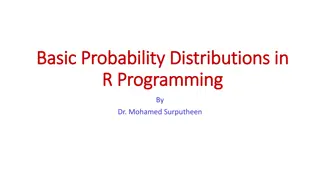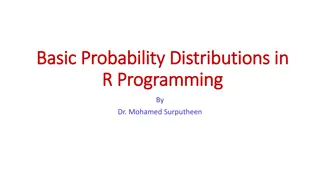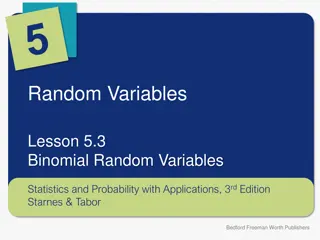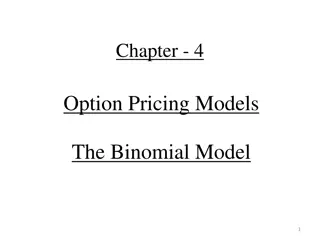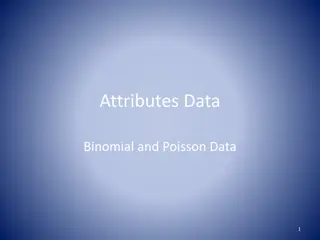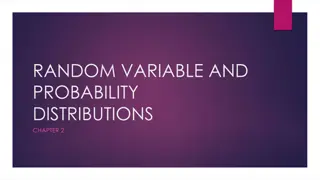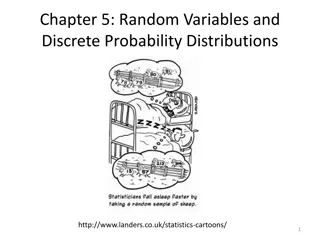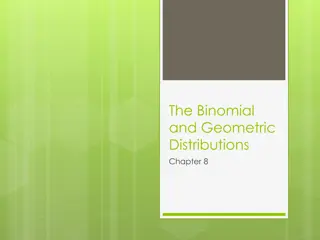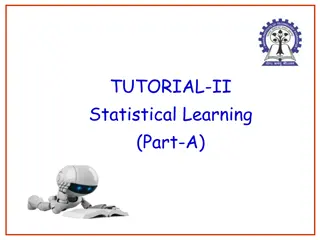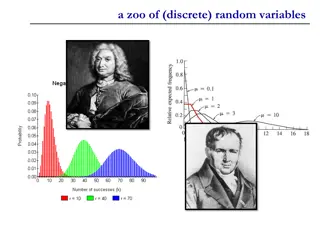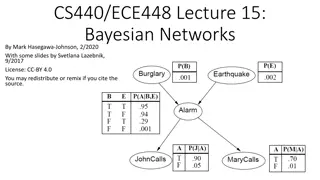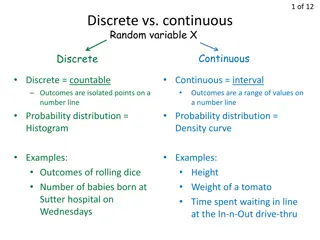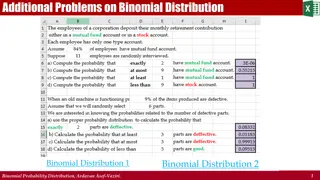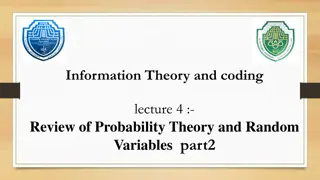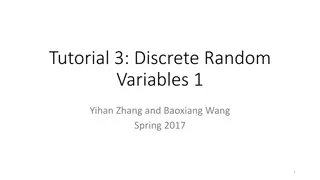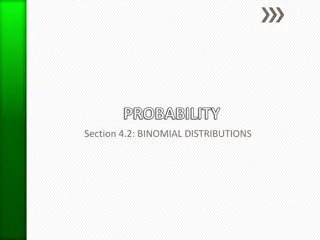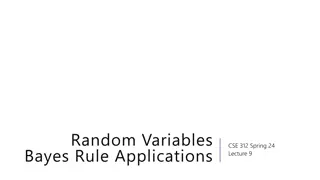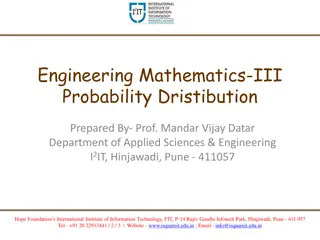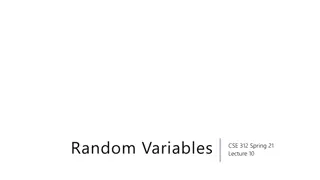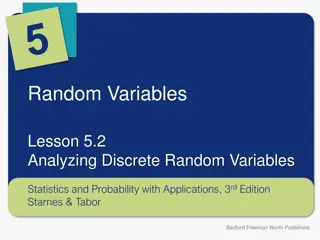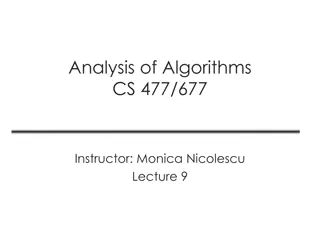Variables in Research Studies
Variables in research studies play crucial roles in examining relationships and drawing conclusions. They include independent variables that influence outcomes, dependent variables affected by independent ones, moderator variables that strengthen or weaken relationships, intervening variables lying
8 views • 34 slides
Binomial Distribution in R Programming
Probability distributions play a crucial role in data analysis, and R programming provides built-in functions for handling various distributions. The binomial distribution, a discrete distribution describing the number of successes in a fixed number of trials, is commonly used in statistical analysi
16 views • 30 slides
Negative Binomial Distribution in Probability Theory
Exploring the Negative Binomial Distribution in probability theory can help us analyze scenarios where multiple trials are needed to achieve a certain number of successes. This distribution provides insights into situations like playing carnival games or conducting independent trials with varying su
0 views • 39 slides
The Binomial Theorem
An explanation of binomials, Pascal's Triangle, and the Binomial Theorem with examples and applications in algebra. Special cases and series expansions are covered, providing insights into the manipulation of binomial expressions for various powers and applications. The content illustrates the expan
1 views • 8 slides
Binomial Expansion: Introduction and Examples
Explore binomial expansion basics, Pascal's Triangle, and examples like expanding expressions with ascending or descending powers. Understand the coefficients, powers of terms, and how to find specific terms in the expansion. Get a glimpse of binomial expansion before delving deeper into Year 12 mat
4 views • 10 slides
Binomial Theorem in Mathematics
Explore the Binomial Theorem in mathematics, covering Pascal's Triangle, binomial expansions, coefficients, general terms, and more. Learn how to expand binomials, analyze powers, find approximate numbers, and determine middle terms. Discover the structure of Pascal's Triangle and apply it to expand
1 views • 37 slides
Binomial Distribution in R Programming
Probability distributions play a crucial role in data analysis, with the binomial distribution being a key one in R. This distribution helps describe the number of successes in a fixed number of trials with two possible outcomes. Learn about the properties, probability computations, mean, variance,
5 views • 30 slides
Binomial Random Variables in Statistics
Binomial random variables arise when independent trials of the same chance process are conducted and the number of successes is recorded based on specific conditions. This lesson covers the characteristics of a binomial setting, such as binary outcomes, independence of trials, fixed number of trials
2 views • 14 slides
Random Variables and Their Applications in Various Fields
Random variables play a crucial role in statistics, engineering, and business applications. They can be discrete or continuous, depending on the nature of the outcomes. Discrete random variables have countable values, while continuous random variables can take on any real number. This article explor
1 views • 6 slides
The Binomial Option Pricing Model
This chapter delves into the fundamental concept of option pricing models, specifically focusing on the Binomial Model. An option pricing model serves as a mathematical framework to calculate the fair value of an option based on certain inputs. The ultimate goal is to determine the theoretical fair
3 views • 38 slides
Variables in Educational Research
Variables in educational research play a crucial role as symbols of events, traits, or characteristics that can be measured and categorized. Different types of variables such as change, effect, and outcome variables are essential in studying causal relationships. Dependent variables represent outcom
8 views • 17 slides
Binomial and Poisson Data Analysis
Discrete data, including Binomial and Poisson data, plays a crucial role in statistical analysis. This content explores the nature of discrete data, the concepts of Binomial and Poisson data, assumptions for Binomial distribution, mean, standard deviation, examples, and considerations for charting a
3 views • 31 slides
Random Variables and Probability Distributions
Random variables are variables whose values are unknown and can be discrete or continuous. Probability distributions provide the likelihood of outcomes in a random experiment. Learn how random variables are used in quantifying outcomes and differentiating from algebraic variables. Explore types of r
2 views • 13 slides
Random Class in Java Programming
The Random class in Java is used to generate pseudo-random numbers. By utilizing methods such as nextInt and nextDouble, you can generate random integers and real numbers within specified ranges. This chapter explores common usage scenarios, such as generating random numbers between specific ranges
2 views • 10 slides
Laplace Transforms for Continuous Random Variables
The Laplace transform is introduced as a generating function for common continuous random variables, complementing the z-transform for discrete ones. By using the Laplace transform, complex evaluations become simplified, making it easy to analyze different types of transforms. The transform of a con
0 views • 17 slides
Variables in Economics
Variables in economics, such as dependent, independent, endogenous, and exogenous variables, play a crucial role in analyzing economic phenomena. Dependent variables are influenced by changes in other variables, while independent variables are not. Endogenous variables are internal and need to be pr
2 views • 8 slides
Random Variables and Probability Distributions
Explore the concept of random variables, differentiate between discrete and continuous variables, understand probability distributions, and calculate probabilities for events using properties of random variables. Dive into examples and probability histograms to grasp key principles.
0 views • 39 slides
Binomial and Geometric Distributions in Statistics
This chapter delves into the Binomial Distribution, detailing properties of a binomial experiment where there are n repeated trials with two possible outcomes. It explains the notation, examples, and scenarios to distinguish between binomial and non-binomial experiments, providing a comprehensive un
0 views • 28 slides
Binomial and Geometric Distributions
The content discusses the properties and examples of binomial experiments, highlighting the key concepts of success, failure, probability, notation, and independence. It explains how to determine if a scenario follows a binomial distribution and provides insightful examples to clarify the concept. A
0 views • 27 slides
Discrete Random Variables and Variance Relationships
Explore the concepts of independence in random variables, shifting variances, and facts about variance in the context of discrete random variables. Learn about key relationships such as Var(X + Y) = Var(X) + Var(Y) and discover common patterns in the Discrete Random Variable Zoo. Embrace the goal of
1 views • 27 slides
Statistical Learning: Discrete Random Variables and Distributions
Explore the concepts related to discrete random variables and their corresponding probability density functions, such as Poisson Distribution and Binomial Distribution. Understand the implications of negative values in random variables, calculate expected values, and grasp the relationships between
1 views • 16 slides
A Zoo of Discrete Random Variables
Discrete random variables play a crucial role in probability theory and statistics. This content explores three key types: Bernoulli random variable, binomial random variable, and error-correcting codes. From understanding the basics of Bernoulli trials to exploring the application of error correcti
0 views • 27 slides
Binomial Theorem: Expansion, Examples, and Applications
Binomial theorem is a powerful mathematical concept used to expand expressions involving binomials. This presentation explores the basics of binomial expansion, formulae for positive, negative, and fractional indices, along with examples demonstrating its application. By leveraging the binomial theo
1 views • 10 slides
Bayesian Networks for Efficient Probabilistic Inference
Bayesian networks, also known as graphical models, provide a compact and efficient way to represent complex joint probability distributions involving hidden variables. By depicting conditional independence relationships between random variables in a graph, Bayesian networks facilitate Bayesian infer
0 views • 33 slides
Random Variables and Mean in Statistics
Random variables can be discrete or continuous, with outcomes represented as isolated points or intervals. The Law of Large Numbers shows how the mean of observed values approaches the population mean as the number of trials increases. Calculating the mean of a random variable involves finding the e
0 views • 13 slides
Binomial Distribution: Examples and Visualizations
Explore various problems and examples related to the binomial distribution, including calculating probabilities, approximations using Poisson distribution, and visual representations. Discover how binomial distribution tends towards normal under different conditions and learn how to solve problems u
2 views • 9 slides
Binomial Expansion in Mathematics
This chapter explores binomial expansion, focusing on the coefficients and powers of variables a and b. The expansion follows Pascal's triangle pattern, with coefficients derived from combinatorial principles. Quickfire Pascal exercises demonstrate coefficient patterns for different powers. An examp
0 views • 22 slides
Randomized Algorithms and Independence Concepts
Types of independence in randomized algorithms are explored alongside the concept of random bit complexity and generation. The idea of mutually independent random variables versus pairwise independent random variables is discussed, illustrating how to generate uniformly random and pairwise independe
1 views • 18 slides
Random Number and Variate Generation Overview
Random numbers play a crucial role in modern computing, aiding in cryptography, simulation, and system testing. This overview delves into the properties of random numbers, the generation of pseudo-random numbers, techniques for generating them, and tests for their validity. It explores the significa
0 views • 59 slides
Binomial Distribution in Probability Experiments
A binomial experiment follows 4 key requirements leading to a binomial distribution. Learn notation, formula, and examples of the binomial distribution's application in calculating probabilities of success in trials.
0 views • 18 slides
Coding Lecture 4: Review of Probability Theory and Random Variables
In this lecture, you will review probability theory, random variables, binary symmetric channels, types of random variables (discrete and continuous), and probability density functions. Understand the concepts with examples and learn about noisy channels. Explore the probabilities associated with di
0 views • 8 slides
Discrete Random Variables and Associated Probability Functions
Explore the concept of discrete random variables, their associated probability mass functions, and examples of typical discrete random variables like the Binomial and Poisson random variables. Understand the difference between discrete and continuous random variables with practical examples.
0 views • 19 slides
Understanding Binomial Distributions in Probability Analysis
Explore the concept of Binomial Distributions in probability theory, including criteria for a binomial random variable, probability formulas, distribution examples, and practical applications. Learn how to calculate probabilities, use calculator notations, and interpret results for different scenari
0 views • 11 slides
Real World Applications of Random Variables and Bayes' Rule in CSE 312 Spring Lecture 9
Explore the practical implications of random variables and Bayes' Rule in real-world scenarios, including understanding infinite processes, calculating probabilities, and defining random variables. Learn methods to find the probability of certain outcomes, such as at least 3 heads in a coin-flipping
0 views • 39 slides
Understanding Probability Distributions in Engineering Mathematics-III
Explore the concepts of random variables and probability distributions including binomial, hypergeometric, and Poisson distributions. Learn about different types of random variables and their applications. Dive into the world of discrete and continuous variables with practical examples.
0 views • 57 slides
Understanding Binomial Random Variables in Genetics
Learn how to analyze binomial random variables in genetics, specifically focusing on the probability of children inheriting type O blood from their parents and calculating mean and standard deviation. Understand the application of binomial distributions in genetics.
0 views • 9 slides
Understanding Binomial Distribution in Probability Theory
Learn about the binomial distribution in probability theory and statistics, which models the number of successes in a sequence of independent yes/no experiments. Understand the key differences between binomial and normal distributions, requirements, and rules for finding binomial probabilities in Ex
0 views • 29 slides
Understanding Random Variables in CSE 312: Lecture Insights
Dive into the world of random variables with a focus on CSE 312. Explore implicit definitions, infinite processes, and methods for calculating probabilities related to random events. Learn about the concept of random variables and how they summarize outcomes in a formal and informal manner.
0 views • 26 slides
Understanding Discrete Random Variables and Their Analysis
Learn how to analyze discrete random variables in statistics, including creating histograms, calculating mean and standard deviation, and interpreting probability distributions. Explore the concept of Apgar scores for newborns and how to calculate the expected value of a random variable. Discover th
0 views • 7 slides
Analysis of Algorithms CS 477/677 Lectures on Random Variables, Expectation, Indicator Random Variables, and Quick Sort
Learn about random variables, expectation, indicator random variables, and the analysis of randomized Quicksort algorithm in these CS 477/677 lectures by Instructor Monica Nicolescu. Understand concepts such as discrete random variables, expected value calculations, and the workings of randomized Qu
0 views • 37 slides

